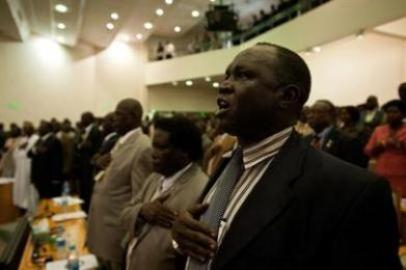Security bill: US calls for inclusive consultations in S. Sudan
October 4, 2014 (JUBA) – The United States administration has urged South Sudan government to engage in an inclusive consultation process on draft legislations seeking to regulate operations of non-governmental organisations and the country’s national security service.

“We are deeply concerned that the current NGO bill, as drafted, could restrict civil society space and hinder the formation and operation of NGOs. As the leading donor of humanitarian and development assistances in South Sudan, we are particularly concerned that this bill would further restrict the delivery of life saving humanitarian assistance and limit the important work that NGOs are doing to promote health, education and overall development,” it adds.
South Sudanese lawmakers are in the process of passing the draft security bill, considered by activists and rights groups as repressive.
In its statement, however, the US welcomed the previous engagement by the government of South Sudan with civil society organisations on the NGO bill and urged the leadership to continue dialoguing with the legislature and civil society entities on both bills.
Strengthening the rule of law and ensuring that a vibrant civil society can contribute to a social economic and political development in partnership with the government will best ensure stability, prosperity and peace for all South Sudanese people, it further stressed.
South Sudan parliament on Thursday failed to reach consensus on passing security bill after some MPs expressed mixed views, with some arguing that the excessive powers to the national security service could be misinterpreted by its personnel.
As such, most MPs wanted the bill revised to reflect the general will of the population.
The bill was drafted by the justice ministry in collaboration with the national security service and submitted to parliament in May 2014.
Both Amnesty International and Human Rights Watch have queried some sections of the draft security bill, which they say gives national security service operatives too many powers to oppress citizens.
The draft bill, analysts argue, does not mention legally permissible places of detention and does not guarantee the right of individuals detained to effective defense or the constitutional right to communicate in private with a lawyer at the moment of arrest.
“It [bill] does not clarify on how to implement constitutional guarantees that people in detention should be informed about the reasons of arrest at the moment of arrest and that they will be presented to a judicial authority within 24 hours,” said an analyst.
He added, “It [bill] vaguely provides that complaints to the National Security Service should be made to the National Security Service itself. It recommends members of the National Security Service to have criminal immunity unless criminal proceedings are authorised by the minister or director general”.
Onyoti Adigo, the minority leader in parliament said the security bill gives government agents excessive powers, which could either be abused or misinterpreted.
“We are afraid that some people can abuse these powers and can arrest anybody”, Adigo told reporters on Thursday.
“In our constitution, article 159(e) talks of national security being professional in its mandate who shall focus on information gathering, analyse them and then after analysing them, advise to the relevant authority to take action”, he added.
Samuel Duwar Deng, the chair of the parliamentary committee on security and public order has, however, urged members of parliament to pass the bill without changes, saying the legislation was in the interest of South Sudanese and thus protect them.
(ST)
